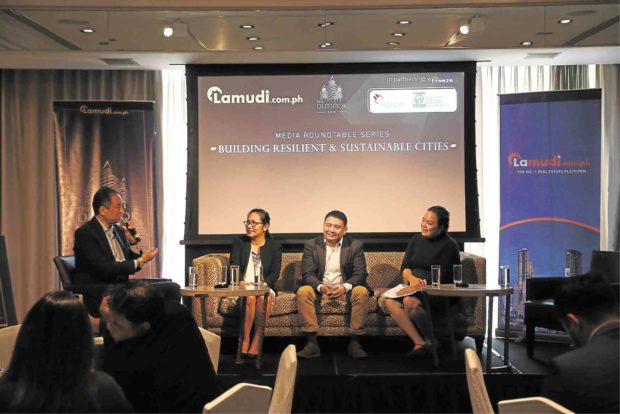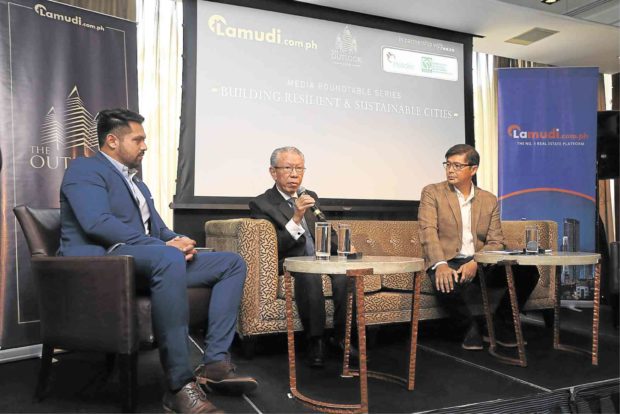Addressing climate change through sustainable cities

(From left) Ferdz dela Cruz, former chief executive officer of Manila Water Co.; Angela Ibay, head of climate and energy program of the World Wide Fund for Nature; Wesley Caballa, senior manager for sustainability of Costa Del Hamilo Inc.; and, Justine Santos-Sugay, director for resource development and communications of Habitat for Humanity
With the climate crisis dangling over our heads, there is no progress without plans for sustainability and resilience.
Experts in green initiatives from the nongovernment and private sectors sent this lucid message during a roundtable discussion hosted by Lamudi Philippines in partnership with Holcim Philippines and the Subdivision and Housing Developers Association (SHDA).
Here now
“It’s inevitable,” Lamudi Philippines CEO Bhavna Suresh said of climate change. She added that between big industrial efforts and small household changes, changes can still address a phenomenon that has adversely affected Filipinos.
“The science has come together already to undisputedly say it is happening and it’s going to get worse before it actually gets better—if we do get our act together,” said Atty. Angela Ibay, head of the climate and energy program of the World Wide Fund (WWF) for Nature.
“Climate change is real,” added Ferdz dela Cruz, former CEO of Manila Water Co. “We have felt that in Manila Water. We actually took the brunt of the shortage even if we have been warning for many years.”
He noted that 90 percent of Metro Manila’s water requirements depended solely on the Angat Dam, which “the rain started missing … last year because of climate change.” With water shortages hitting the metropolis on a regular basis, he said: “We’re dependent on one dam; we have not built a second dam for sustainability.”
“We are already in an area of the world that is highly, highly susceptible to all these natural disasters, and climate change made us more vulnerable,” said Justine Santos-Sugay, director for resource development and communications of Habitat for Humanity. “The Philippines … and a lot of other poor countries are the most susceptible to the effects of climate change.”
Fortunately, business ethos has begun slowly changing in favor of the environment.
“The only way that we will see individuals actually follow the rules is if you put a system of checks, balances and penalties,” said Wesley Caballa, senior manager for sustainability of Costa Del Hamilo Inc.
Hamilo Coast has implemented guidelines to conserve water and safeguard the environment from climate change, said Caballa. It aims to be a “microcosm of what could be done,” as it practices a “top-down approach” on implementing sustainable policies.

(From left) James Buskowitz, chief executive officer of Buskowitz Group; Arch. Amado de Jesus, vice chairman of the Philippine Green Building Initiative; and, JJ Fernandez, strategic management consultant of Menarco Development Corp.
Green development can also be gleaned from the many buildings intentionally designed to address issues of sustainability and resilience.
Jaime “JJ” Fernandez, strategic management consultant of Menarco Development Corp., offered Menarco Tower as an example: “There is an estimate that the tenant will save about 20 percent in terms of energy consumption because the way the building is built is very efficient.”
Solar energy also has a huge potential in the sunny Philippines, said James Buskowitz, CEO of Buskowitz Group. “If we combine all the roofs in the entire Metro Manila, we would have enough solar energy to power the entire Philippines.”
Roadblocks
While green development has been on the table for many real estate developers and experts, a huge void in the grassroots is derailing changes.
“When you ask a common fisherman, ‘What do you know about climate change?’ Sometimes they say it’s synonymous to disaster without knowing why,” said Caballa. “It’s really important for them to know what is wrong, what climate change is all about.”
Ibay asked: “Most of our coastal municipalities want to be cities eventually. How do we push them towards not just sustainability but also push them to also look at measures that will make them resilient as well?”
“There are no easy choices at this point. For us to make that, we need to have a constructive dialog and without the misinformation,” said Dela Cruz.
The discussion needs to be sustained, added Amado de Jesus, vice chairman of the Philippine Green Building Initiative.
“If you have a bigger role, that’s a bigger responsibility,” he said. “Lamudi is a giant brand. With all the buildings that are together, the organizations that you have a big influence on, you can create a big impact.”